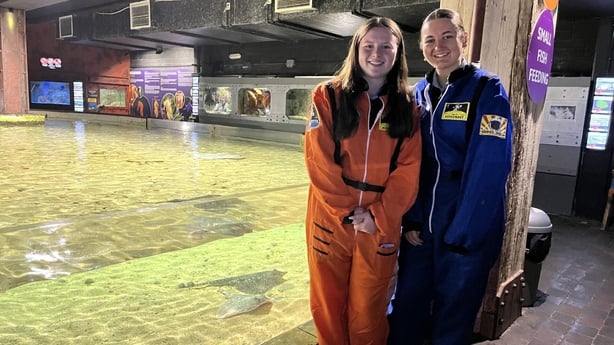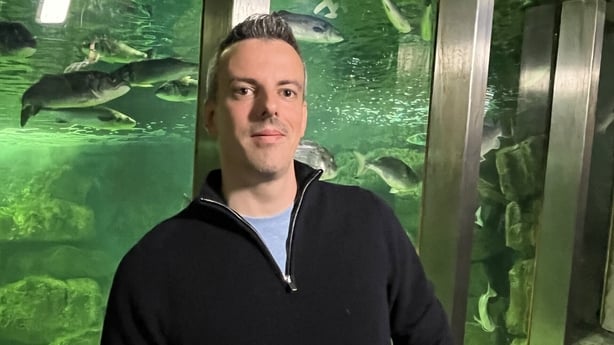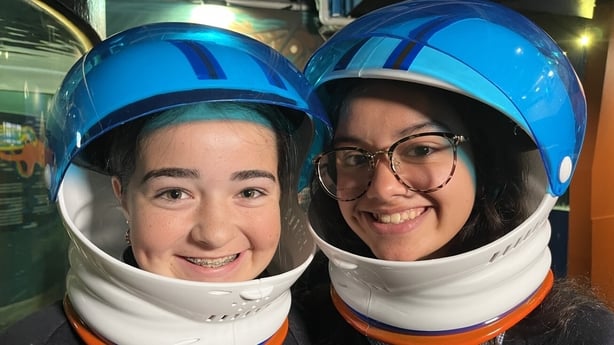The link between Earth's oceans and the ongoing search for life beyond our planet is one of the themes being explored as part of Space Week. Former US astronaut Steve Swanson visited Galway's Atlantaquaria in Salthill to kickstart his national road trip.
October is an exciting month for anyone interested in space or just curious about the universe. And for students from Dominican College, Taylor's Hill in Galway, the possibility of life on alien oceans was the fascinating topic up for discussion.
As NASA's Europa Clipper mission prepares to launch towards Jupiter this week, Steve says the best chance of finding some form of life is in the ocean world beneath icy moons.
"Europa is believed to have a vast subsurface ocean beneath its frozen crust, and similar environments may exist on other moons in our solar system.
"By studying how organisms survive in Earth's extreme marine environments, scientists hope to gain insights into what life might look like in these extraterrestrial oceans.
"Europa is one of Jupiter's fascinating satellites and the unique conditions in Earth’s deep oceans - such as extreme pressure, darkness, and temperatures - can help inform our understanding of potential habitability of Europa's oceans."
Steve has flown three space missions to the International Space Station, logged 195 days in space and completed five spacewalks. He is the recipient of a NASA Exceptional Achievement Medal.
Students Kate Keady and Ava Joyce said they loved hearing about space exploration and both are considering physics as a Leaving Cert subject.

The visit of a NASA astronaut to Salthill's Atlantaquaria inspired the naming of a starfish in his honour. Starfish Steve is fast becoming a tourist attraction.
Steve has flown two shuttle flights, STS-117 and STS-119, and one Soyuz flight, TMA-12M. All of the flights were to the International Space Station. He has logged over 195 days in space and completed five spacewalks totalling 28 hours and five minutes.
Steve has served in other roles at NASA, such as a CAPCOM for both International Space Station and Space Shuttle missions. His awards and honors include the NASA Exceptional Achievement Medal.
Protecting the environment is a key theme of Space Week. Rob O'Sullivan is National Outreach Coordinator for Space Week. He says space exploration has been "kicking up a notch in recent years" and it needs to be done in a sustainable way.

"You know, we can't be just throwing waste up there. We can't be burning excessive fossil fuels, etc, to find our way into space.
"So space exploration itself must be sustainable. But the flip side, then is what space exploration can tell us about sustainability here on Earth. And my favourite example is the International Space Station. If you think about it, it's a closed system, kind of like our planet is, and they have to have everything that they need up there.
"It's very difficult to get supplies up and down, you know, with any kind of regularity. So everything needs to be minimised. Reduce, Reuse, Recycle is a core mantra. Even the water that they have up there is reclaimed and recycled.
"So this whole idea of, you know, reducing your waste and finding ways to adapt to difficult environments is something that we can learn from here on Earth and apply to places that are already suffering from climate change, you know, maybe there are lessons from space on how to adapt to that."
Rob says Earth observation satellites allow us view the whole planet as a system.
"We're always talking about space as this thing where we're looking out, but we're very lucky in that we have a whole bunch of satellites orbiting us, looking back down and letting us track problems on a global scale.
"For example we can see, not only, you know, if it's raining excessively in Galway. We can see if it's raining excessively across the whole planet, see what kind of energy patterns are causing that which is really useful."
Rob says Earth is unique and unmatched by any other planet discovered so far.
"This pale blue dot is our home and we need to protect it and keep it."
Mary Kate Keenan said she was thrilled to visit Galway's Atlantaquaria and is keen to pursue a career in science.
"We're wearing these helmets specially today because we're both space mad. Who knows, maybe we'll be off to space one day."
The girls chuckled out loud at the notion of being astronauts and Iris Grace Barbosa quipped "maybe I'll be a marine scientist".

"We really appreciate Steve and Rob coming here today. They've been hugely informative about the various species in our oceans and I'm excited to think that there may well be alien life in the water," Iris Grace continued.
Petra Kerkhove works at the Atlantaquaria in Salthill and admits she's a bit "obsessed" with marine life.
"I find life in the deep oceans really, really exciting. And there's so many things we don't know about yet. With more research and outer space exploration we're learning more every day and there are other worlds just waiting to be discovered."







